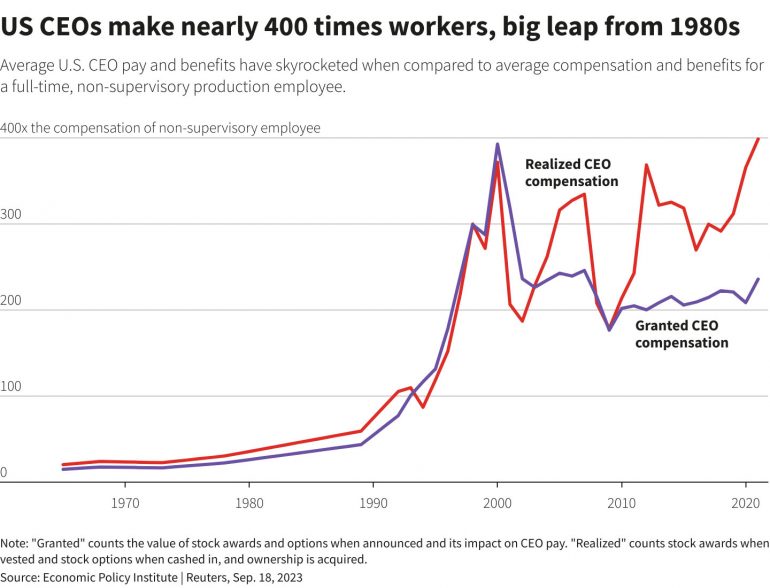
The recent strikes organized by the United Auto Workers (UAW) union at assembly plants owned by major U.S. automakers, including Ford, General Motors (GM), and Stellantis, have brought a critical question to the forefront: When CEOs receive substantial pay raises, what should the workers rightfully expect?
At the center of this labor dispute is the demand made by UAW President Shawn Fain, who initially called for a 40% increase in workers’ pay over the next four years. This figure was inspired by the roughly 40% surge in CEO compensation at these companies over the preceding four years. Notably, these increases in executive pay occurred during a period of stable profits for two out of the three automakers.
However, the issue of disproportionately high CEO compensation is not unique to the automotive industry. CEO pay and benefits have experienced exponential growth in recent decades, while worker compensation has failed to keep pace. The Economic Policy Institute reported in 2022 that the CEO-to-worker pay ratio at the largest U.S. companies had surged from less than 40 to 1 over the past four decades to nearly 400 to 1.

Source: Economic Policy Institute / Reuters
In stark contrast, some of the workers at these Big Three automakers, who were engaged in protests on the highways spanning from Ohio to Michigan, disclosed that they were forced to juggle two jobs merely to make ends meet. This glaring income inequality issue has ignited discussions about the need to reshape the U.S. economy to achieve fairness for workers and citizens, a longstanding goal of President Joe Biden’s economic plan. President Biden has stressed that capitalism should serve the interests of the American people, but he contends that decades of “trickle-down” tax cuts benefiting corporations and the wealthy have undermined this very principle.
As the strikes commenced, President Biden echoed the sentiments of UAW President Shawn Fain, urging automakers to allocate a more substantial share of their profits to their workers. However, the White House’s influence is somewhat limited in this regard, relying mainly on the power of persuasion rather than direct intervention. It is also actively exploring strategies to mitigate the economic repercussions of an extended labor strike.
Efforts to address the issue of escalating CEO pay in the past have yielded mixed results, as noted by Rosanna Landis Weaver, the director of wage justice and CEO pay at As You Sow, a non-profit shareholder advocacy group. While salaries of top executives were curtailed in some instances, they found alternative means to enhance their compensation, often through stock options that were perceived as “free money.” This adaptive response illustrated that attempts to squeeze pay in one area had the effect of inflating compensation in another, creating a situation where the balloon was never fully squeezed but merely redirected elsewhere.
Source: Reuters

Mike Floyd is a finance executive by trade and a car enthusiast at heart. As a CFO with a keen eye for detail and strategy, Mike brings his analytical mindset to the automotive world, uncovering fresh insights and unique perspectives that go beyond the surface. His passion for cars—especially his favorite, the Porsche 911, fuels his contributions to Automotive Addicts, where he blends a love for performance and design with his professional precision. Whether he’s breaking down industry trends or spotlighting emerging innovations, Mike helps keep the site both sharp and forward-thinking.